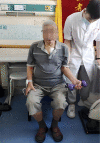Individualised monitoring programme for pulmonary rehabilitation of patients with chronic obstructive pulmonary disease-study protocol for a randomised controlled trial
- PMID: 38249927
- PMCID: PMC10797334
- DOI: 10.21037/jtd-23-964
Individualised monitoring programme for pulmonary rehabilitation of patients with chronic obstructive pulmonary disease-study protocol for a randomised controlled trial
Erratum in
-
Erratum to individualised monitoring programme for pulmonary rehabilitation of patients with chronic obstructive pulmonary disease-study protocol for a randomised controlled trial.J Thorac Dis. 2024 Jul 30;16(7):4836. doi: 10.21037/jtd-2024-01. Epub 2024 Jul 22. J Thorac Dis. 2024. PMID: 39144337 Free PMC article.
Abstract
Background: Chronic obstructive pulmonary disease (COPD) is characterised mainly by exertional dyspnoea, which may lead to activity reduction. Pulmonary rehabilitation (PR) is considered capable of mitigating these impairments. However, access to PR is limited to specialised centres, especially during the coronavirus disease 2019 pandemic. Moreover, low-cost home rehabilitation programmes have non-individualised prescriptions, which might lead to inconsistent clinical effects in patients with COPD. Therefore, it is important to develop new, low-cost protocols involving individualised prescriptions and staff supervision.
Methods: This is a descriptive protocol for a randomised controlled study at the Grade III A Hospital in Tianjin. The sample size was calculated according to a described formula. Fifty-six participants will be selected and randomly allocated into two groups: (I) control (traditional PR training, medication, and nursing interventions); and (II) intervention [PR training in the hospital and at home by the Cardiopulmonary Rehabilitation System Management Platform (CSM)]. The protocol will be performed twice a week for 8 consecutive weeks in the outpatient clinic, and the training will be performed by the application of the CSM system in the final 6 months of the trial. The study will assess lung function and physical fitness and analyse the scores of the modified Medical Research Council Dyspnoea Scale, the COPD assessment test, the International Classification of Functioning, Disability, and Health, and the 6-minute walk test before and after the training protocol. Comparison of differences will be performed using repeated measures analysis of variance, a linear mixed effects analysis, or a non-parametric test, which will include only participants who completed all outcome measures and followed the intervention protocol. The study results will be disseminated through presentations at scientific conferences and publications in peer-reviewed journals.
Discussion: The new, low-cost supervised rehabilitation programmes are expected to present positive results, making PR programmes more accessible and effective for patients with COPD.
Trial registration: The study was registered in the Chinese Clinical Trial Registry: ChiCTR2000040723.
Keywords: Chronic obstructive pulmonary disease (COPD); mobile health technology; pulmonary rehabilitation; randomised controlled trial.
2023 Journal of Thoracic Disease. All rights reserved.
Conflict of interest statement
Conflicts of Interest: All authors have completed the ICMJE uniform disclosure form (available at https://jtd.amegroups.com/article/view/10.21037/jtd-23-964/coif). The authors have no conflicts of interest to declare.
Figures








Similar articles
-
Active mind-body movement therapies as an adjunct to or in comparison with pulmonary rehabilitation for people with chronic obstructive pulmonary disease.Cochrane Database Syst Rev. 2018 Oct 10;10(10):CD012290. doi: 10.1002/14651858.CD012290.pub2. Cochrane Database Syst Rev. 2018. PMID: 30306545 Free PMC article.
-
Effects of a long-term home-based exercise training programme using minimal equipment vs. usual care in COPD patients: a study protocol for two multicentre randomised controlled trials (HOMEX-1 and HOMEX-2 trials).BMC Pulm Med. 2019 Mar 1;19(1):57. doi: 10.1186/s12890-019-0817-7. BMC Pulm Med. 2019. PMID: 30823913 Free PMC article.
-
Effects of different modalities of inspiratory muscle training as an add-on to conventional treatment of patients with chronic obstructive pulmonary disease (COPD): study protocol for a randomized controlled trial.Trials. 2019 Apr 24;20(1):231. doi: 10.1186/s13063-019-3271-1. Trials. 2019. PMID: 31014365 Free PMC article.
-
Protocol for a single-centre mixed-method pre-post single-arm feasibility trial of a culturally appropriate 6-week pulmonary rehabilitation programme among adults with functionally limiting chronic respiratory diseases in Malawi.BMJ Open. 2022 Jan 31;12(1):e057538. doi: 10.1136/bmjopen-2021-057538. BMJ Open. 2022. PMID: 35105655 Free PMC article.
-
Telerehabilitation for chronic respiratory disease.Cochrane Database Syst Rev. 2021 Jan 29;1(1):CD013040. doi: 10.1002/14651858.CD013040.pub2. Cochrane Database Syst Rev. 2021. PMID: 33511633 Free PMC article.
Cited by
-
Erratum to individualised monitoring programme for pulmonary rehabilitation of patients with chronic obstructive pulmonary disease-study protocol for a randomised controlled trial.J Thorac Dis. 2024 Jul 30;16(7):4836. doi: 10.21037/jtd-2024-01. Epub 2024 Jul 22. J Thorac Dis. 2024. PMID: 39144337 Free PMC article.
References
-
- Global Strategy for the Diagnosis, Management and Prevention of COPD, Global Initiative for Chronic Obstructive Lung Disease (GOLD) 2022. Available online: https://goldcopd.org/2023-gold-report-2/
-
- Shenoy MA, Paul V. Pulmonary Rehabilitation. Treasure Island, FL, USA: StatPearls Publishing; 2023. - PubMed
LinkOut - more resources
Full Text Sources
Research Materials
